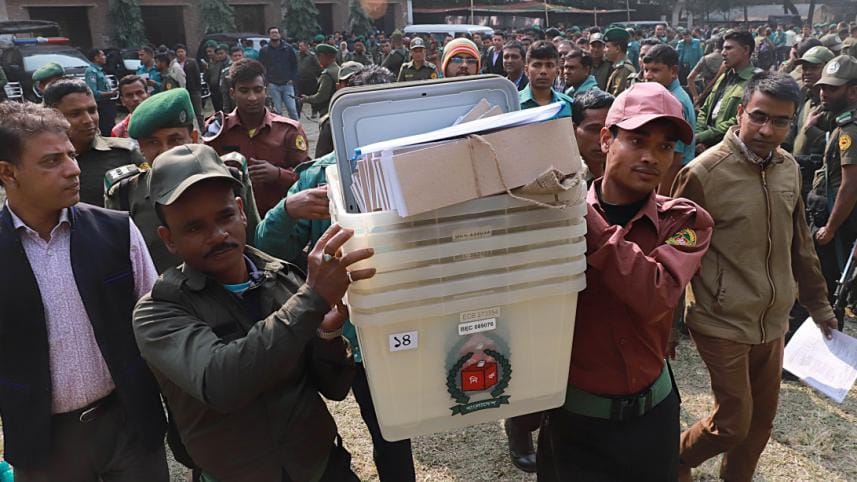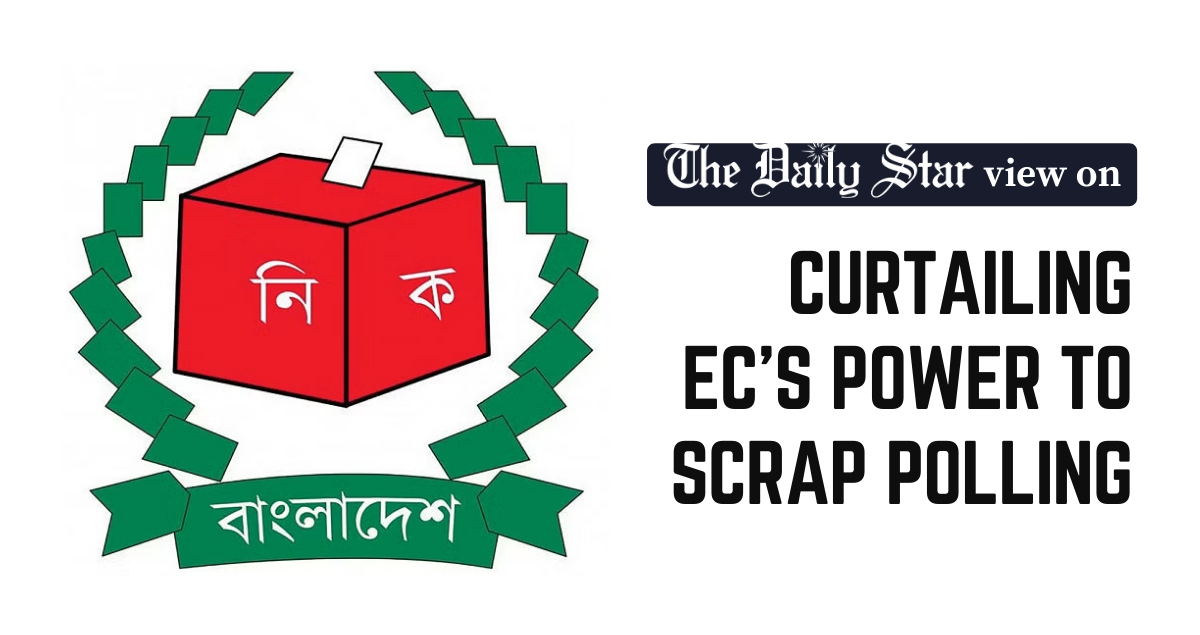Why tie up EC’s hands further?

In Bangladesh, whether it is the Awami League or the BNP, the incumbent always vouches for the neutrality and independence of the Election Commission. On the other hand, whichever party is in the opposition camp, for its part, fervently maintains that the commission is nothing more than a puppet installed by the incumbent and completely subservient to the ruling regime. The people, i.e. the voters, have always tried to sift through the rhetoric to discern just how neutral the commission will be, come election day.
This issue has recently come to the fore following the amendment of the Representation of the People Order (RPO), which stipulates the powers the election office holds. This latest amendment, which was passed in parliament last week, curtailed the EC's authority to react to election-rigging, violence or irregularities. The law now stipulates that the commission can only suspend elections at specific polling centres where irregularities take place, and not in the entire constituency (as had happened during Gaibandha 5 by-polls last year). Furthermore, the commission can suspend elections only on polling day. But an election is not an issue of one day – it's a process spanning days and weeks, sometimes months. And its sanctity could be deemed to have been endangered at any time during the course of that process.
The provision empowering the EC to halt or suspend elections was included during the Shamsul Huda-led commission, and two elections – 2014 and 2018 – were conducted under this provision. There were no explanations as to why such a sudden change of that provision was necessary. Although the opposition lawmakers protested and questioned how the incumbent EC would conduct an impartial election if it was not given the power to suspend polls, when the bill was passed, Law Minister Anisul Huq said suspending polls in an entire constituency over disturbances in some polling stations was "undemocratic," and that's why this amendment had been made. The law minister reasoned that each constituency usually has 100-150 polling centres. The EC's power of suspending polling at all centres is not democratic if violence and/or irregularities are reported at only a few centres. "It would impede people's right to vote because no violence or irregularities were reported at the rest of the polling centres," he said. But does that justify the curbing of EC's power?
Coming back to the Gaibandha-5 by-polls, the incumbent Election Commission stopped the by-polls in October, saying the situation had gotten "out of control" due to widespread irregularities. The EC was lauded for such a brave and rare move, while many ruling party leaders criticised it. But when it came to punishing the alleged officials, the EC remained toothless and ineffective.
The move comes at a critical juncture when the demand for holding a free and fair election in Bangladesh is getting louder at home and abroad, with the next parliamentary polls just a few months away. With the commission's authority to react in the face of irregularities being restricted, the participating parties are also deprived of means to seek remedy if and when a situation arises. For instance, if a candidate is forced to stay away from the constituency or barred from submitting the nomination form, should there not be a system of remedy? What would happen if voters are terrorised before the polling day, which stops them from venturing out to vote?
As for a single incident affecting the entire constituency, there are dozens of such examples when a single instance of violence engulfed the entire constituency and even spilled over to other areas spreading fear and panic. In all this, Gono Forum MP Mokabbir Khan's comment rings true. He said in parliament, "Laws are enacted in the country for the benefit of some individuals, groups and the government."
Coming back to the Gaibandha-5 by-polls, the incumbent Election Commission stopped the by-polls in October, saying the situation had gotten "out of control" due to widespread irregularities. The EC was lauded for such a brave and rare move, while many ruling party leaders criticised it. But when it came to punishing the alleged officials, the EC remained toothless and ineffective. Many political commentators believe that the government curtailed the EC's authority to prevent any recurrence of the Gaibandha-5 by-election.
Civil society organisation Shushashoner Jonno Nagorik (SHUJAN), in a statement, said the EC was yet to gain the trust of all political parties and organisations, and the amendment to the RPO would further undermine its confidence and make it a powerless institution to conduct fair elections.
This sort of a move is nothing new for the incumbent government. The Huda Commission in 2008 had also introduced the provision of a "No" vote in the election if the voters did not feel confident about any of the candidates. A total of 0.55 percent votes cast in the ninth parliamentary election were "No," and the highest percentage was found in the Rangamati constituency (9.66 percent). But the ruling Awami League cancelled that provision before the 10th parliamentary election held in 2014, most likely to prevent potential embarrassment. It appears the incumbents are becoming apprehensive of an increasing number of scenarios that might embarrass them in the upcoming election.
Mohammad Al-Masum Molla is chief reporter at The Daily Star.




 For all latest news, follow The Daily Star's Google News channel.
For all latest news, follow The Daily Star's Google News channel. 

Comments